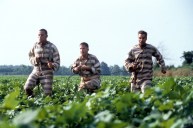[dropcap]F[/dropcap]ans of roots music know Dan Tyminski as one of the genre's preeminent players and voices. As a member of Alison Krauss & Union Station, Tyminski tours the world and racks up critical acclaim — not to mention award hardware. In fact, he owns 14 Grammy Awards, both from work as a solo artist and as a collaborator.
Videos by Wide Open Country
But even if you don't follow the roots world, you've likely at least heard Tyminski's golden pipes. He provided the singing voice for George Clooney's character in the movie O Brother, Where Art Thou? And in 2013, he racked up hundreds of millions of streams singing on Avicii's global hit "Hey Brother."
But now, Dan Tyminski is stepping out on his own with an ambitious new project that's sure to turn heads and raise eyebrows, whether you already know him or not.
Gunning for the Radio
On Southern Gothic, Tyminski pipes dark themes through infectious hooks wrapped in layers of impeccable production. It's a far cry from his rootsy background. And it was all kind of an accident.
"The whole record was not something I initially set out to do," Tyminski tells Wide Open Country. "But it ended up turning a corner."
Originally, Tyminski took a publishing deal with a company in Nashville. The goal, as with most publishing deals, was to write songs with other writers around town, pitch them to artists and eventually land them on the radio. "I was trying to go down Broadway of commercial country music," he says, referencing the popular tourist street in Nashville where cover bands play radio hits on loop.
"And when I walked into a room, everybody wanted to write something like Avicii's 'Hey Brother,' because that was a big deal when I first started my publishing deal," Tyminski says. "I always tried to fight against that. For me it was about finding something new."
Eventually, writes got a little stale. And trying to craft songs that fit in the radio box five days a week can be a bit of a bore. "It wasn't until we started stepping outside of the box with a few of these writers that it started to excite me," Tyminski says.
Southern Gothic
One song outside of the box, in particular, sparked something in Tyminski."'Southern Gothic' is a case example," he says. "I was driving home from the write and I was actually jealous of the song. Because I didn't want to give it away."
And honestly, it's the kind of song that might sit on the shelf for years in somebody else's hands. In the song, Tyminski points a mirror at society, taking a picturesque southern town and peeling off the mask. "Every house has got a bible and a loaded gun," he sings. "We got preachers and politicians. Round here, it's kind of hard to tell which one is gonna do more talking with a crooked tongue."
Good luck getting Luke Bryan to sing that.
But it's a song that really inspired more tunes on the record. And it contains a batch of themes that persist throughout the 13-track album. Hypocrisy, religion, love, lust, loss, poison (both metaphorical and real). Maybe that's why UMG Nashville offered Tyminski a record deal to make the songs himself.
"At that point I was actually under contract with Rounder Records to make another bluegrass album," Tyminski says. "I have to credit Rounder for realizing this was a unique opportunity for me. They let me out of that deal to pursue this record."
Just Call It Music
For Southern Gothic, Tyminski teamed up with songwriter and producer Jesse Frasure, whose written, produced and remixed some of the biggest acts in country and pop music. He's even DJ'd parties for some of hip hops biggest acts, including Lil Wayne, Drake and Nicki Minaj. Frasure's faith in Tyminski fueled the unlikely collaboration.
"I felt a high level of confidence going into this with Jesse producing it and accepting that I was doing something very different," Tyminski says. "This project unfolded in front of me in an undeniable way. I had to honor the music we created. I wasn't thinking about genres."
Ultimately, Tyminski crafts a body of work underscored by often haunting sentiments. In quite a few songs, there's a struggle between a sullen, weighty lyric and an anthemic melody. When it really clicks, it produces beautiful results, like on album ender "Numb." For Southern Gothic, Tyminski wanted to serve the song, not preconceived notions of his style of music or genre conventions.
In fact, Tyminski doesn't waste his time worrying about how people may perceive it at all. "It's impossible not to be aware that the margins are pretty wide on country radio," he says. "What passes under the label of country music would've never passed a few decades ago. But there's a huge world out there where people like everything. It's country, it's pop, it's roots, it's electronic. At the end of the day I hope we can just come together and call it music."




